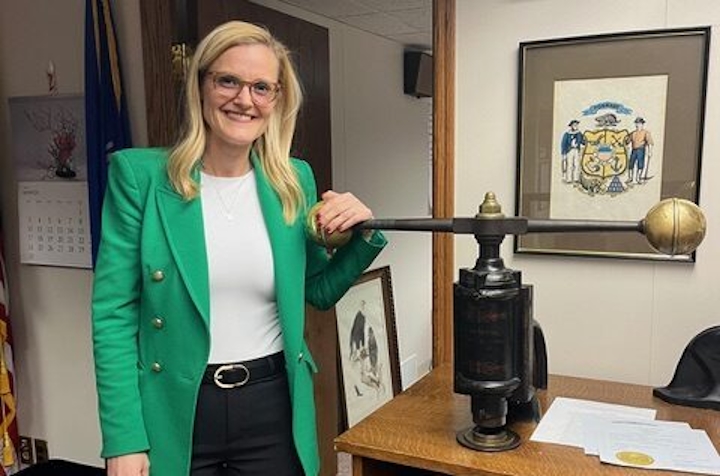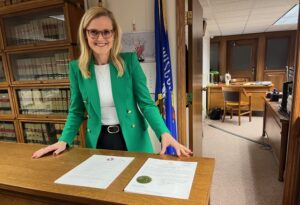Sarah Godlewski’s Struggle for Democracy
Seeking student workers to help understaffed election clerks, despite Republican opposition.

Wisconsin Secretary of State Sarah Godlewski with the machine that affixes the Great Seal of Wisconsin | Wisconsin Examiner photo
Working out of her basement office in the State Capitol, Secretary of State Sarah Godlewski is waging a scrappy, under-the-radar fight to protect elections and democracy in Wisconsin.
A year ago, Godlewski inherited her 900-square-foot office from now-retired S.O.S. Doug La Follette, whose powers and resources had been stripped by Republicans in the Legislature over the years. In 2015, they cut the secretary’s budget nearly in half, took away two of three staff positions and moved the constitutional officer from a spacious office overlooking the Capitol dome to a couple of subterranean rooms stacked to the ceiling with boxes of records.
The diminished stature of the secretary of state in Wisconsin, and the fact that the office does not oversee elections, as it does in some states, doesn’t render it entirely powerless.
Grabbing the tools that come to hand
Take the state seal, affixed using a weird-looking contraption with a large wheel and brass knobs, designed in 1881. When Godlewski started in her new job, she thought the ancient machine, which is used to put the gold Great Seal of Wisconsin on documents was a decorative relic. Nope.
The secretary of state uses it to manually affix thousands of seals on documents certifying Wisconsinites’ ability to conduct international commerce and overseas adoptions, not to mention elections.
The Wisconsin secretary of state plays a role in presidential elections by affixing the seal to the Certificate of Ascertainment of the electors — the document that attests to who the actual and correct elected presidential electors are. The secretary also acts as a witness when the governor signs the certificate and maintains a copy of the electors’ votes.

Wisconsin Secretary of State Sarah Godlewski in her office, displays real and fake electors’ documents | Wisconsin Examiner photo
On a recent weekday afternoon, Godlewski showed me the actual, sealed certificate of Wisconsin’s electoral votes for Joe Biden in 2020 alongside the non-sealed fraudulent electoral certificate for Donald Trump, with its smeary ink stamp. The fakeness of the Trump document was obvious.
“Our office is not in the limelight, but it’s critical,” Godlewski says, for its work “protecting the integrity” of official acts of government, including the vote.
Last fall, Godlewski began traveling the state, meeting with local clerks, asking them what they needed and how the secretary of state could help them.
It’s no secret that the county and municipal clerks who administer elections are under tremendous pressure. Targeted by election conspiracy theorists, concerned for their personal safety and under intense scrutiny while short on staff and resources, a lot of them have recently quit. Of the 72 county clerks in Wisconsin, 30 will be running their first-ever presidential election this year.
Election clerks under pressure
At the municipal level, where there are over 1,800 clerks, there’s a similar exodus, says La Crosse County Clerk Ginny Dankmeyer, “because more and more is being asked of them and they’re not getting the resources they need.”
At the same time, a deluge of open records requests is bogging down understaffed clerks’ offices all over Wisconsin. During the last election cycle, Dankmeyer received a request for every absentee ballot certificate envelope cast in the county. “I spent five days doing nothing but scanning certificate envelopes to fulfill that request,” she says. “We want to be transparent and we believe in open records,” she adds, “but it takes a lot of time.”
She attributes a recent rash of retirements in part to changes in technology that can be hard to keep up with and the challenges of managing a sudden upsurge in absentee voting during the pandemic. “But we’re also under a lot more criticism than ever before,” she says. “Scrutiny is fine. But this mistrust — why put up with it?”
During one recent election, says Kono, “I had one voter say, ‘I know there are scales inside that machine. Every machine has scales in it.’ ” She tried to explain that it wasn’t true. “Or people didn’t want to use my touch screen voting machine, because they thought it was connected to the internet or it would change their vote.”
Not only does the machine not connect to the internet, she adds, the town hall where it’s located can’t get a reliable wifi connection.
“Anymore I just say, ‘Do you think I’m trying to steal your vote or rig the election?’ They say, ‘No, not you, but in Madison or Milwaukee…’ ”
“I’ve lost all patience,” Kono adds. “But if I’m not there, who is? I want my vote to count. I consider my vote sacred. And I feel like I have to stay, regardless of how fed up I am, because I know how to do this.”
Kono, Dankmeyer and other clerks around the state were surprised and happy to be contacted by the secretary of state’s office asking what kind of help they needed.
“It feels great to have someone at the state level taking an interest in helping clerks throughout the state, who often feel forgotten,” says Douglas County Clerk Kaci Jo Lundgren. “Particularly I can say that from the northern part of the state.”
Getting work study students to help
The clerks told Godlewski their No. 1 need was staff.
Some of the small towns in northern Wisconsin where Lundgren lives have a single part-time clerk and no support staff — and they, too,, have been deluged with open records requests, she says.
Kono, who earns a $6,000 stipend for her work as town clerk, in addition to running elections also manages the town’s payroll, writes up the budget, creates agendas for town meetings and fills out a plethora of reports.
She led a letter from 18 state secretaries to the U.S. Department of Education, asking for a change in guidance that would make it possible for federally funded work study students to do nonpartisan election work.
On Feb 27, Vice President Kamala Harris announced the work study initiative as part of an effort by the administration to protect voting rights.
The work study program, Harris said in remarks from the White House before meeting with voting rights leaders, “will now allow students to get paid, through federal work study, to register people and to be nonpartisan poll workers.”
Clerks around the state have been enthusiastic about the idea.
“It’s a really great program,” says Dankmeyer. “It’s going to get help into municipal and county clerks’ offices, and help where they’re short on poll workers.”
And the clerks say it trains a new generation of election workers.
Republican backlash
Republican U.S. Rep. Bryan Steil (R-Janesville) immediately blasted the move, deriding the vice president for posting a photo on X (formerly Twitter) of someone she described as a “nonpartisan poll worker” eligible to participate in the work study program who “it was later revealed … is actually a staff member at the Alliance for Justice and formerly worked for the American Civil Liberties Union of Georgia.”
Exhibit A of the “nonpartisan” poll workers Biden and Kamala want to pay. https://t.co/9cSv2FV07p
— Bryan Steil (@RepBryanSteil) February 29, 2024
Steil acknowledged in a letter to Secretary of Education Miguel Cardona that the Alliance for Justice and the ACLU are, in fact, nonpartisan groups, but, he wrote, the fact that student election workers could belong to them means “voters cannot trust that this new program will not run afoul of federal law or be used by partisan students to help their political party win an election.”
Steil’s attack, dubbing the work study program “Bidenbucks,” fits in with other Republican efforts that fan the flames of baseless conspiracy theories and ramp up pressure on elections officials while at the same time blocking adequate resources from reaching beleaguered local clerks.
In the face of all this pressure, Wisconsin’s secretary of state is trying to help, deploying sheer grit and creativity and grabbing every tool at her disposal.
“We need the next generation to want to go into this work,” she says of the effort to connect work study students with local clerks.”
It’s vital to democracy.
“Wisconsin has a history of understanding how important the next generation is,” she adds. “That’s why public education is in our state constitution. But if they don’t know how democracy works, that’s when we fail.”
For Godlewski, failure is not an option.
Ruth Conniff, Editor-in-chief of the Wisconsin Examiner.
Sarah Godlewski’s underground struggle for democracy was originally published by Wisconsin Examiner.




















And just why are Republicans so afraid of democracy and enabling everyone who is eligible to vote, to be able to participate with their vote? I know, the question answers itself.
This is just one more example of the hypocrisy of the GOP stance that election results cannot be trusted.
They have become masters of creating election lies, and shouting them from the highest mountaintop as loudly and as often as possible until even they believe them.
At the same time they go about doing their best to reverse engineer the work conditions and regulation constraints that the people who administer these same elections must abide by, not the least of which is underfunding them. And voila! Their original point is proven, at least in their narrow minds.